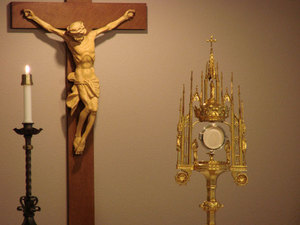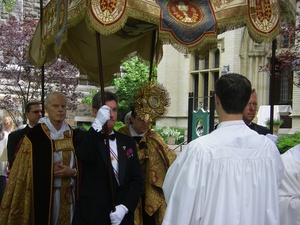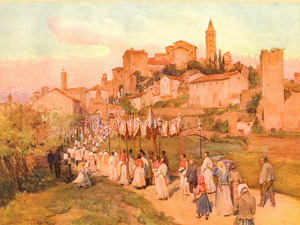At churches around the world today we'll notice processions with the Blessed Sacrament in honor of the Feast of the Most Holy Body and Blood of Christ (also called Corpus Christi). New Haven, Connecticut is no different:
served by the Dominican Friars celebrated the Mass and formed a procession around the block though a small portion of the Yale University neighborhood. The Very Reverend Father Joseph Allen, OP, prior and pastor of Saint Mary's presided at Mass and led the procession. Allen reminded us of Christ's gift of Presence to the Church and it is an extension of Christ's sacred humanity and divinity
, and the fruit of that presence is unity of faith and service to neighbor. Also assisting Father Allen in carrying the Blessed Sacrament is the recently ordained Dominican student brother, Brother Austin, assigned for the summer to Saint Mary's Priory and Church.
We took Christ to the streets where He is little known and if he is known there, He is often neglected. "Our faith in the God who took flesh in order to become our companion along the way needs to be everywhere proclaimed, especially in our streets and homes, as an expression of our grateful love and as an inexhaustible source of blessings" (John Paul II,
Mane nobiscum Dominie, 2005)
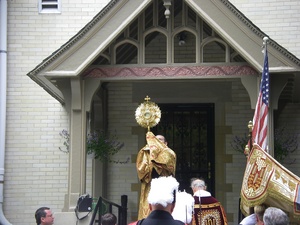
The Corpus Christi festival clearly echoes the Holy Thursday commemoration of the institution of the Eucharist. Benedict XVI's words come to mind:
We must never forget that the Church is built around Christ and that, as St Augustine, St Thomas Aquinas and St Albert the Great have all said, following St Paul (cf. 1 Cor 10:17), the Eucharist is the Sacrament of the Church's unity, because we all form one single body of which the Lord is the head. We must go back again and again to the Last Supper on Holy Thursday, where we were given a pledge of the mystery of our redemption on the Cross. The Last Supper is the locus of the nascent Church, the womb containing the Church of every age. In the Eucharist, Christ's sacrifice is constantly renewed, Pentecost is constantly renewed. (Benedict XVI, homily closing the 49th Eucharistic Conference, Quebec, June 22, 2008)
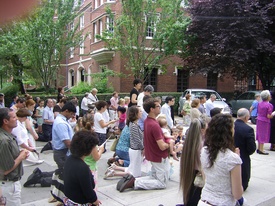
You may recall that since the 14th century a custom formed in carrying the Blessed Sacrament around town following Mass. Popes encouraged this devotional practice --even giving indulgences to those who walked with the Blessed Sacrament-- and by the 16th century, the Council of Trent approved a public demonstration of the faith in the Eucharistic Presence. Through the various periods of Church history extraordinary events and processions developed with every segment of civil society taking part. In some countries the faithful wrote "Plays of the Sacrament" or performed "Eucharistic dances" as they did in Seville (not the type done by Sister Mary Leotard) to express their faith in the enduring Presence of the Lord.
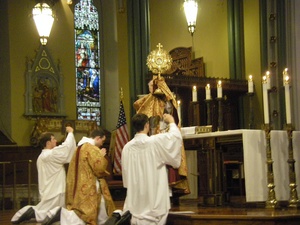
Today's Eucharistic procession stopped at stations, a typical Roman liturgical custom, for a moment of prayer with the Blessed Sacrament which included singing "Tantum ergo," the a prayer, benediction and the recitation of the Divine Praises. For us two points were selected outside the church and one at the main altar calling to mind the practice of Pope Martin V.
Holy Mother Church teaches us that her observance of Corpus Christi is a response that's both doctrinal and pertaining to Divine Worship in the face of wrong teaching on the place of the Eucharist in ecclesial life. In many places, either in CCD, preaching at Mass or in conversation among friends, the mystery of the real presence of Christ in the Eucharist is misrepresented or ignored. Looking at many examples of contemporary church architecture I've noticed the displacement of the Eucharist from being central to the margins of the Church (cathedrals and monastic churches excepted). This is especially crazy when pastors renovate their traditional churches and move the tabernacle to a side chapel based on a mis-reading of the church documents and a faulty eucharistic theology. If you are in the NYC area stop by at the Jesuit Church of St Francis Xavier on West 16th Street and you'll see what I mean. There the Jesuits moved the tabernacle to a side altar and replaced the traditional place for the tabernacle with components of a baptistry (a review of the recent renovation later). The concern for the Eucharist as central to one's life is obviously nothing new to us today --or in the 2000 year history of the Church-- as it was a concern of Pope Urban in 1264 when he gave the Roman Church this feast.
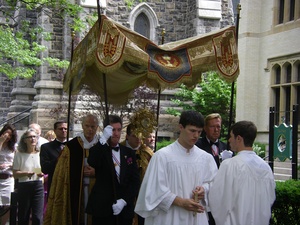
Let me conclude by giving two principles that articulate Catholic belief in the Eucharist and the reason why we take the Blessed Sacrament on the road:
1. the supreme reference point for Eucharistic devotion is the Lord's Passover; the Pasch as understood by the Fathers, is the feast of Easter, while the Eucharist is before all else the celebration of the Paschal Mystery ... the Passion, Death and Resurrection of Christ;
2. all forms of Eucharistic devotion must have an intrinsic reference to the Eucharistic Sacrifice, or dispose the faithful for its celebration, or prolong the worship which is essential to that Sacrifice (Directory of Popular Piety).
What we did today and what others around the world did, is to make a public profession of faith in the promise of Christ to be with us till the end of time in the enduring Presence of Christ in the Eucharist.
